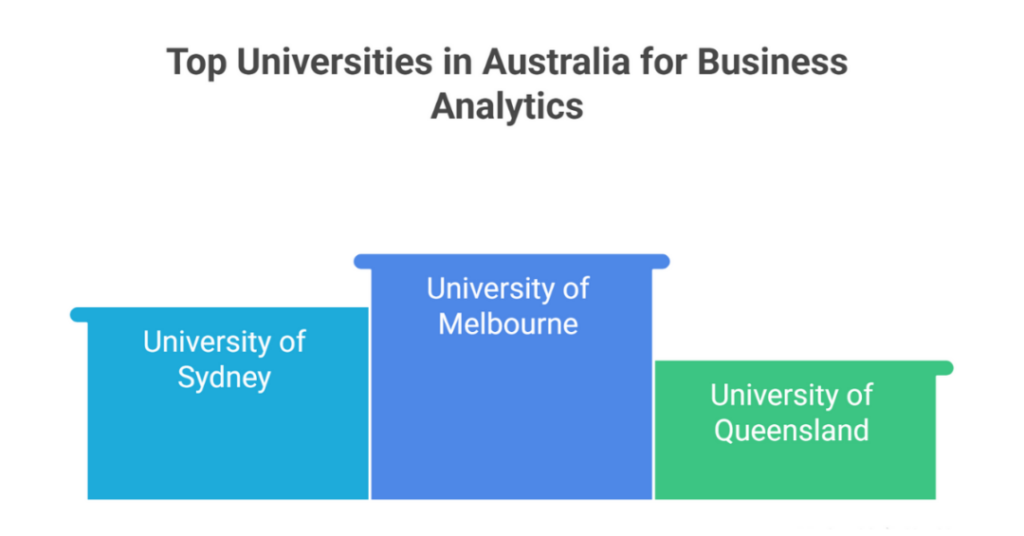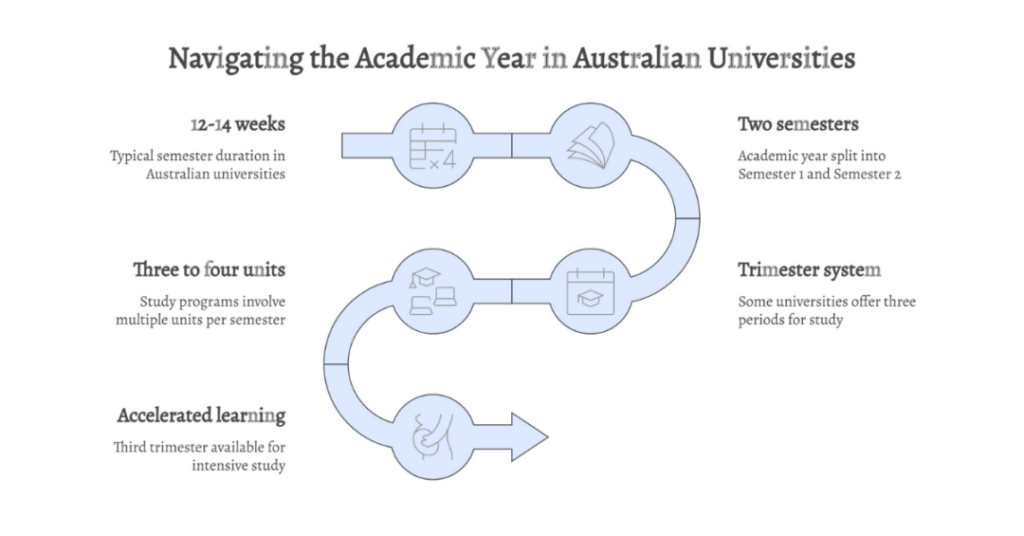12 September 2025
7 minutes read
10 Best Universities in Australia for Business Analytics for Indian Students

Key Takeaways
- The best universities in Australia for business analytics give international students access to world-class programs, QS rankings, and industry-ready skills.
- Australia offers scholarships, internships, and strong business school links that reduce the high cost of living while building global business exposure.
- Admission requires GPA, transcripts, IELTS or TOEFL, and a strong statement of purpose, with work experience adding an advantage for analytics professionals.
Let me start this piece with a reality check. The world runs on data today, and those who can turn messy spreadsheets into money-making decisions are treated like gold. By 2030, the demand for analytics professionals is set to skyrocket by more than 20%. In other words, if you still think business analytics is just about Excel charts, sorry to say this but you’re technically living in the Stone Age.
Now this one is for the Indian students. The process of studying in Australia is not just about picking any university and hoping for the best. The difference between a top-ranked business school and an average program in Australia can decide whether you land a job at Deloitte in Sydney or struggle with odd jobs in Melbourne.
In today’s brutal global business environment, best universities in Australia for business analytics is not really a luxury but a survival measure.
How to Be a Business Analyst?
Do you recall that famous line from The Matrix: “There’s a difference between knowing the path and walking the path”? That is what business analytics is all about. I will be honest with you. These days, every single person talks about data.

However, only a few students are capable of turning it into worthy business decisions and I really want you to be one of the capable ones.
- Get the right skills and not simply the degree: Predictive modelling, machine learning, and business intelligence are not buzzwords. They’re what separate a data analyst from a data scientist. You need to understand that employers want only professionals who can model outcomes, not just crunch targets.
- Work experience is underrated: Don’t let anyone fool you and trust me, I will never let that happen to you. Even if you’re pursuing a master of business analytics program, relevant work experience in the field of business analytics gives you a real edge. Let me break it to you, recruiters need problem-solvers and not robots.
- Learn business skills, not just coding: Do you remember SRK’s line in Chak De India: “Mujhe states ke naam na sunai dete hai na dikhai dete hai, sirf ek mulk ka naam sunai deta hai, I-N-D-I-A.” Similarly, employers don’t see just “Python” or “R.” They see whether you understand global business, industries, and your capability to apply analytics across various industries.
10 Best Universities in Australia for Business Analytics for Indian Students
Alright, another reality check! Australia offers some of the world’s best universities in the field of business analytics, producing students with advanced skills and knowledge needed to survive the competitive global business world.
Now you know the significance of Australia. Did you know that the University of Melbourne is ranked in the top 1% of universities in the world by QS World University rankings? That’s the level of education we’re talking about here.
1. University of Melbourne
The master’s in business analytics program here is designed to equip students with advanced data-driven business skills. One of my students landed a data scientist role at PwC within six months of graduation. He made me proud (I’m emotional).
2. University of Sydney
If you think Sydney is just a beautiful city, I got you here! The University of Sydney is where business analytics offers a model program designed to provide students with both predictive analytics and real-world applications.
3. University of Queensland
Located in Brisbane, this program in Australia focuses heavily on predictive modelling and machine learning. One international student I know turned his capstone project into a startup. Like him, I would rather see you suffer from success than suffer from debts.
4. Macquarie University
Macquarie is known for producing analytics professionals who both crunch data and understand business problem frameworks. Their business school is globally recognized.
5. University of Western Australia
This program is designed for international students seeking world-class education in analytics. A former student from India told me how the internships here shaped his career as a business intelligence analyst.
6. Deakin University
Deakin has a practical approach, where students gain practical experience through industry projects. Think of it as a real-world lab where theory and application meet. They turn you into the Ricky Ponting of Analytics (until Dhoni enters).
7. Victoria University
What makes Victoria University stand out is its flexible program in Australia for working professionals. One part-time student I mentored completed his MBA and analytics program side by side. I bet Glenn Maxwell was his inspiration for those two fabulous switch hits.
8. Monash University
Ranked in the top 500 universities in the world, Monash’s business analytics program includes data analytics and business environment insights. Are you a student aiming for global business exposure? Just go for it!
9. RMIT University
RMIT in Melbourne focuses on predictive analytics and machine learning applications. Their graduates often land roles in international business environments. I want you to end up there as well.
10. University of Technology Sydney (UTS)
UTS is known for a fabulous master of business analytics program that equips students with advanced business intelligence skills. Employers particularly love the mix of technical and business professionals it produces.
Let us take a quick glance at the best universities in Australia for business analytics and their offerings:
| University | Location | Program Focus | Unique Edge |
|---|---|---|---|
| University of Melbourne | Melbourne | Data-driven business skills | Ranked in QS World University top 1% |
| University of Sydney | Sydney | Predictive analytics & applications | Industry partnerships |
| University of Queensland | Brisbane | Predictive modelling & ML | Capstone project leading to startups |
| Macquarie University | Sydney | Business problem frameworks | Globally recognized business school |
| University of Western Aust. | Perth | World-class education in analytics | Strong internship opportunities |
| Deakin University | Melbourne | Practical & industry-focused | Real-world labs for applications |
| Victoria University | Melbourne | Flexible for working professionals | MBA + analytics combo opportunities |
| Monash University | Melbourne | Data analytics + business environment | Global business exposure |
| RMIT University | Melbourne | Predictive analytics & ML | Strong global job placements |
| UTS | Sydney | Business intelligence & skills | Produces hybrid business professionals |
Why Study at the Top Universities for Masters in Business Analytics in Australia?
The business world today generates 2.5 quintillion bytes of data daily, and yet, companies still complain they don’t have enough analytics professionals. That’s not the irony folks. It is the opportunity. Australia can give international students the exact skills and knowledge needed to turn raw data into meaningful business decisions.
Like MS in Business Analytics in USA, Australian universities also expose you to global business networks and opportunities for students across industries. But I assure you that the high cost of living in Australia really pays off in your career returns.
If your dream is to become a part of the future of business intelligence analysts, then aiming for the right university should be your ultimate goal. If you didn’t know, Australia also hosts the best universities for media studies and the best universities for computer science as well.
What is the Eligibility Criteria and Application Process for Masters of Business Analytics in Australia?
Let me get this straight. Application process of a master of business analytics program in Australia is not as easy as watching cricket and judging the players.

Think of it like preparing for a Bollywood audition in Bombay in the 50s. If your statement of purpose and GPA don’t shine, you’re out.
- English language proficiency: Tests like IELTS, TOEFL, or PTE are mandatory. Many universities in the world accept IELTS or TOEFL as proof.
- Academic records: You need transcripts, GPA scores, and sometimes standardized tests like GRE, GMAT, SAT, or ACT depending on the program.
- Supporting documents: Letter of recommendation, resume, personal statement, and a statement of purpose matter as much as technical skills.
Application Requirements Table:
| Requirement | Details |
| GPA | Minimum 2.5–3.0 (varies by university) |
| English Language Proficiency | IELTS (6.5+), TOEFL (80+), PTE accepted |
| Tests (if required) | GRE, GMAT, SAT, ACT (varies by program) |
| Documents | Resume, transcripts, LOR, SOP, personal stmt |
| Work Experience | Preferred but not always mandatory |
What is the Overall Cost of Studying Masters in Australia (Tuition Fee and Living Expenses)?
I know you are tired of reality checks but okay. The cost of living in Australia doesn’t come cheap, and tuition fees can burn through your savings faster than an IPL match drinks break. Yet, for analytics professionals, you can only imagine how good the return on investment is.
Cost Breakdown Table:
| Category | Average Cost (per year) |
| Tuition Fees | AUD 35,000 – AUD 55,000 |
| Living Expenses | AUD 21,000 – AUD 25,000 |
| Accommodation | AUD 10,000 – AUD 15,000 |
| Miscellaneous | AUD 5,000 – AUD 7,000 |
Total estimated cost can shoot up to around AUD 60,000 – AUD 70,000 per year, depending on the university and lifestyle.
What are the Scholarship Opportunities at Universities Offering Masters in Business Analytics in Australia?
Remember that line from 3 Idiots: “Success ke peeche mat bhago. Excellence ka peecha karo, success jhak maarke tumhare peeche aayegi.” Scholarships in Australia work exactly like that. Focus on excellence, and financial aid will follow. What if you don’t follow? The financial aid will push you and run over you.

Scholarship Opportunities Table:
| University | Scholarship Options | Coverage |
| University of Melbourne | Melbourne Graduate Scholarship | Partial to full tuition |
| University of Sydney | Sydney Scholars India Equity Scholarship | Up to AUD 40,000 |
| University of Queensland | UQ International Scholarships | Partial fee waiver |
| Macquarie University | Vice-Chancellor’s International Scholarship | 25–50% tuition waiver |
| Deakin University | Deakin Vice-Chancellor’s Meritorious | Up to 100% tuition |
| Monash University | Monash University International Merit Scholarship | AUD 10,000 per year |
| RMIT University | Future Leaders Scholarship | 20% tuition discount |
| University of Western Aust. | Global Excellence Scholarship | Up to AUD 48,000 |
| UTS | UTS International Postgraduate Scholarship | AUD 5,000 – AUD 10,000 |
| Victoria University | VU Global Excellence Scholarship | 20% fee reduction |
Conclusion
Coming from my experience, business analytics in Australia offers more than just degrees. It gives you access to industries hungry for data-driven decision makers. The key takeaway I would like to offer you? Please pick your university wisely.
Remember that the right one can instantly transform you from just another data analyst into a global business professional. If you’re serious about studying abroad, get expert guidance instead of Googling endlessly like a test match that ends in draw; goes on forever but has no result.
At Ambitio, we help international students like you build profiles, craft winning statements of purpose, and choose programs designed to equip students with the skills in data analytics that employers demand. Ready to start? Let’s make your global business career a reality.
FAQs
What are the best universities in Australia for business analytics?
Leading Australian universities include the University of Melbourne, Monash University, University of Sydney, University of New South Wales (UNSW), Australian National University (ANU), University of Western Australia, Deakin University, RMIT University, La Trobe University, and Victoria University.
What are the common eligibility requirements for Indian students?
Applicants generally need a bachelor’s degree (preferably in a quantitative or business field), an IELTS score of 6.5 or above, and in some cases, work experience or a valid GRE/GMAT score.
Are there scholarship options for Indian students in business analytics?
Yes, several universities offer scholarships covering 10%–100% of tuition fees based on academic merit, extracurriculars, and work experience.
How long is a business analytics master’s degree in Australia?
Most programs take 1–2 years to complete full-time, with some universities also providing part-time or online study options.
What is the average total cost for Indian students?
The total cost, including tuition, accommodation, and living expenses, typically ranges from AUD 79,800 to AUD 97,800 per year.
What are typical starting salaries for graduates?
Fresh graduates can expect salaries between AUD 60,000–80,000, with experienced professionals potentially earning above AUD 130,000.
Does a Master in Business Analytics help with Australian PR (Permanent Residency)?
Yes, business analytics is listed on Australia’s Medium and Long-term Strategic Skills List (MLTSSL), offering good pathways for permanent residency through skilled visas.

You can study at top universities worldwide!
Get expert tips and tricks to get into top universities with a free expert session.
Book Your Free 30-Minute Session Now! Book a call now




























